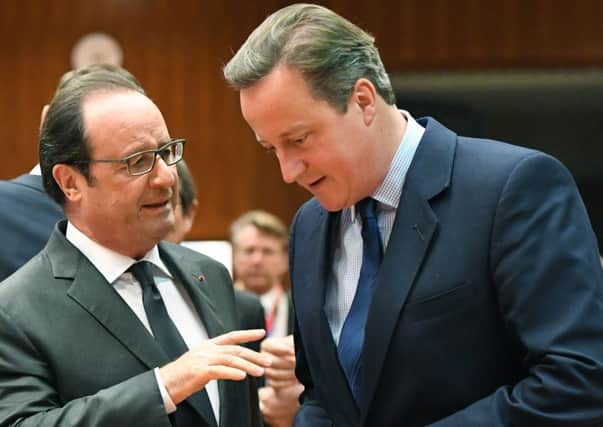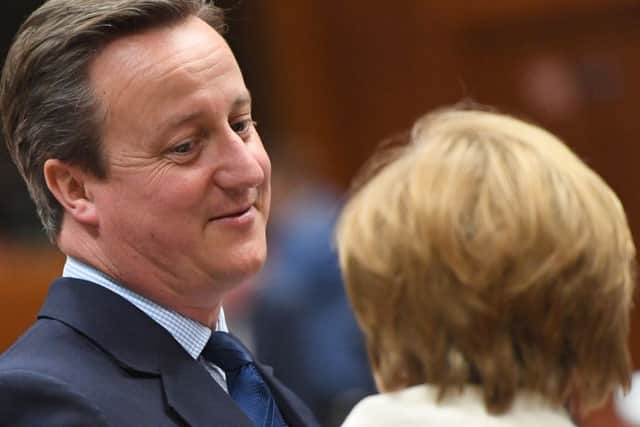Cameron has '˜no regrets' over calling Brexit vote and blames immigration for defeat


And he warned that any intransigence over freedom of movement could scupper any chance of a UK-EU trade deal with the new prime minister who takes over from him in September.
Mr Cameron was speaking after German chancellor Angela Merkel warned the UK must accept free movement if it wants to retain access to the single market after withdrawal, as some non-members like Norway do.
Advertisement
Hide AdAdvertisement
Hide AdMr Cameron also said he regretted the Brexit result but did not regret holding the referendum adding: “it was the right thing to do.”


After a meeting with leaders on the European Council he also said there had not been a clamour from other nations for Britain to trigger Article 50 quickly - which would set its departure from the European Union in motion.
Earlier Merkel had assured the German Parliament that she would not allow the UK to “cherry-pick” favoured elements of the EU package, she said: “If you wish to have free access to the single market then you have to accept the fundamental European rights as well as obligations that come from it. This is as true for Great Britain as for anybody else.”
Over dinner with fellow leaders in Brussels at his final European Council summit as Prime Minister, Mr Cameron set out his assessment of the reasons behind Thursday’s shock 52%-48% referendum vote for Brexit.
Advertisement
Hide AdAdvertisement
Hide AdA Government source said: “He believes that one of the key issues in the referendum campaign, and therefore why a lot of people voted to leave, is this sense that there was no control on the scale of immigration and freedom of movement. That was one of the factors.”


Mr Cameron’s message to EU leaders was that if they want a close economic relationship with the UK after Brexit, they cannot “shy away” from the migration issue.
Mr Cameron told the House of Commons on Monday that there was “a very strong case” for trying to remain in the single market after Brexit. Chancellor George Osborne backed this position, telling a business conference in London that Britain should seek “the closest possible ties” with its former EU partners on trade.
Downing Street said Mr Cameron was clear with EU leaders that decisions on withdrawal negotiations would be for his successor to take. He is not understood to have set out any blueprint for the future shape of the UK’s relations with Europe.
Advertisement
Hide AdAdvertisement
Hide AdA Number 10 source said he stressed that in was in the interests of both the UK and the EU to maintain as close an economic relationship as possible, and suggested that the key to this would be a fresh look at the thorny issue of the freedom for EU citizens to live and work anywhere in the Union.
He urged them to take a “pragmatic and positive” approach to an issue which he expects to continue to exercise voters during the two-year negotiation period leading up to the UK’s final departure.
Reform of the movement principle was a bridge too far in Mr Cameron’s pre-referendum renegotiation of the terms of British membership, when he secured only changes to migrant welfare rules rather than the “emergency brake” on immigration which had been mooted.
The Brexit vote has forced freedom of movement to the top of the agenda across Europe, with populist parties in several countries seeking to follow Ukip in making it a central plank of demands to leave the EU. Meanwhile, Brussels remains embroiled in long-running discussions with Switzerland over the non-member’s reluctance to sign up to the principle.
Advertisement
Hide AdAdvertisement
Hide AdThe leader of the French National Front, Marine le Pen, said she would call a referendum if she won next year’s presidential election, telling BBC Two’s Newsnight the Brexit vote was “the most important moment since the fall of the Berlin Wall”.
Ms Le Pen commended “the courage of the British people who didn’t allow themselves to be intimidated by the threats, blackmail, and lies of the European elites”.
Arriving in Brussels for the summit, Mr Cameron said: “Britain will be leaving the European Union, but I want that process to be as constructive as possible and I hope the outcome will be as constructive as possible.
“While we are leaving the European Union, we mustn’t be turning our backs on Europe. These countries are our neighbours, our friends, our allies, our partners and I very much hope we will seek the closest possible relationship in terms of trade and co-operation and security, because that is good for us and it’s good for them.”
Advertisement
Hide AdAdvertisement
Hide AdWhile several EU leaders repeated calls for talks on withdrawal to start immediately, there were signs that some are beginning to accept that the process must await the selection of a new PM, with the Netherlands’ Mark Rutte saying: “It would be unwise to force a rapid departure. It would be prudent to give Britain time.”
European Commission president Jean-Claude Juncker said Brussels officials have been ordered not to enter into any “secret negotiations” with the UK. And he made clear that Britain will not be allowed to dictate the terms of its new relationship with Europe, saying: “It is we who must decide what happens, not just those who wish to leave.”
Downing Street characterised talks between Mr Cameron and Mr Juncker ahead of the summit as “amicable and constructive”.
But the president had a less friendly exchange with Nigel Farage in the European Parliament chamber, asking the Ukip MEP: “Why are you even here?”
Advertisement
Hide AdAdvertisement
Hide AdThe pair were later seen to make up with a hug, with the tactile commission president even appearing to kiss the Ukip leader on the ear.
In highly charged exchanges, Mr Farage was booed and barracked as he told MEPs they had laughed at his demand for withdrawal when he first arrived in Brussels 17 years ago, adding: “You’re not laughing now.”
Mr Juncker told MEPs of his sadness over the Brexit vote, telling them: “The British vote has cut off one of our wings, as it were, but we’re still flying.”
Danish PM Lars Lokke Rasmussen urged fellow EU leaders to take the time to get Brexit right, for the sake of future generations who might suffer from a chaotic outcome.
Advertisement
Hide AdAdvertisement
Hide AdIn a message tweeted from the Council meeting, Mr Rasmussen said: “The children always pay the price for a bad divorce. Next generation will judge us on the ability of UK to leave wisely. No rush.”
Estonian PM Taavi Roivas said the atmosphere as leaders discussed Brexit over dinner was “sad but constructive”, adding: “Huge challenge, but together we will manage.”
Malta’s PM Joseph Muscat told Sky News the summit was “like a wake. We have lost a member of our family”.